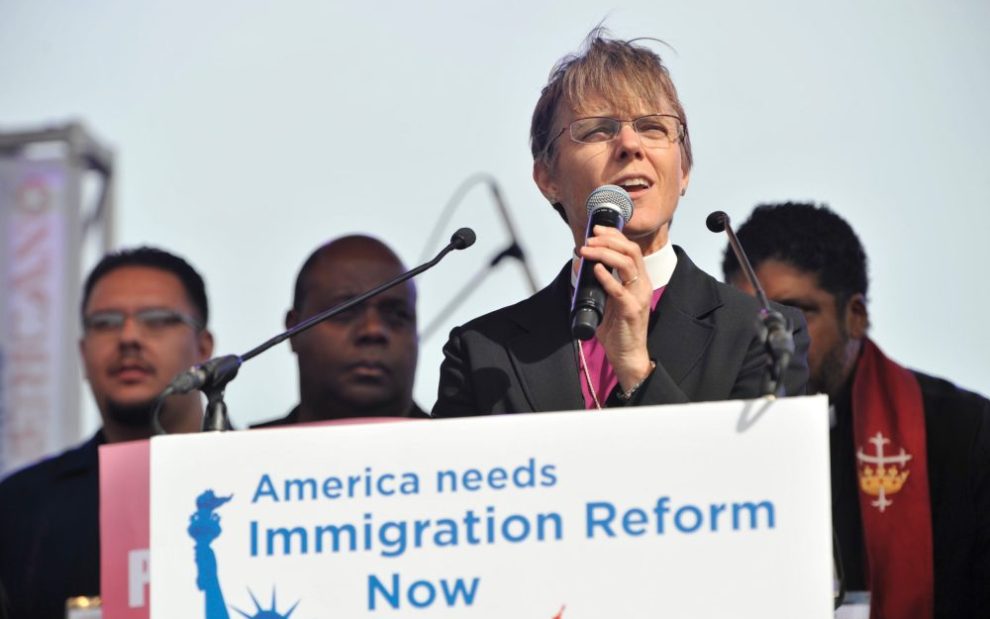“Feed my sheep.” (John 21:17)
In John’s gospel, Jesus asks Peter, “Do you love me?” When Peter affirms that he does, Jesus responds, “Feed my lambs.” Jesus asks Peter again and again while Peter gets progressively more distressed until finally, after the third time he is questioned, Jesus says, “Feed my sheep.”
This year, we hear this reading on the third Sunday after Easter, and it’s one that I have ruminated on throughout the years. I always thought Jesus was referring to Peter’s responsibility to take care of us, humanity. We say that Peter was the rock on which the church was built. He was to guide us, lead us.
But now I realize that when Jesus says, “Feed my sheep” to Peter, he is saying it to all of us. As Jesus became bread blessed, broken, and distributed among his people, so must each of us, be blessed, broken, and given to others. We must feed the sheep.
When the other gospels describe the Last Supper, they include Jesus’ words: When Jesus says, “This is my body,” he is referring to the bread he holds in his hands, but he is also referring to his body, which will soon be literally broken on the cross. He ends the discourse of the meal saying, “Do this in remembrance of me.”
John’s gospel account of the Last Supper doesn’t include a clear description of the blessing of the bread and wine; rather, it focuses on the washing of the feet, a clear explanation of what the blessing of the bread means. Jesus, as he has over the previous three years of his ministry, demonstrates to his friends what it means to be broken.
Today, during Communion, we take the bread and eat it in remembrance of Jesus. But do we take it further? Do we see Communion as a call for us to be broken for the sake of others, as Jesus was?
After the resurrection, as Jesus prepares a meal at the Sea of Tiberias, I’m sure Peter is reminded of the Last Supper. Maybe he didn’t make the connection at first, but eventually he got there. As Jesus feeds Peter and the others, he calls on them (and us) to feed others, whether the other disciples or people today.
Yes, this happens at Mass, true, but it also must happen in other ways: We must be broken. Perhaps for some this means being literally broken as martyrs, but there are other ways of being broken, too.
Recently, I read about Bishop Mariann Budde, the Episcopal Bishop of Washington, D.C., and how she preached at an interfaith prayer service at the Washington National Cathedral with President Trump attending. During her sermon, she asked the president to have mercy toward all the people who are scared at this present moment, including migrants and LGBTQ+ people.
The president was visibly disturbed by her words. After the service, he asked for an apology, but she didn’t give any. People called her “woke,” disturbed, or even satanic. Others described her as standing in the tradition of the prophets or as Jesus addressing the crowds.
Could you do what she did among your family, friends, or coworkers? You can’t speak in this fashion from a position of pride or power. Think of Philippians 2: Jesus “emptied himself, taking the form of a slave, coming in human likeness; and found human is appearance, he humbled himself, becoming obedient to death, even death on a cross.”
Peter was called to empty himself, be broken, and given to the disciples, to the people of his time. Bishop Budde was called to empty herself in a similar way. We are called to empty ourselves, to be broken, for others. And when we do this, we trust that God can work through us as God worked through Jesus. “Feed my sheep.”
This article also appears in the May 2025 issue of U.S. Catholic (Vol. 90, No. 5, page 9). Click here to subscribe to the magazine.
Image: flickr.com/jaymallinphotos















Add comment